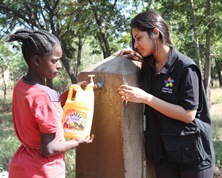I n Ethiopia teachers and student leaders have greatly benefited from water, sanitation and hygiene (WASH) education and attitudes and handwashing practices have been significantly improved through latrine maintenance.
n Ethiopia teachers and student leaders have greatly benefited from water, sanitation and hygiene (WASH) education and attitudes and handwashing practices have been significantly improved through latrine maintenance.
These were findings from a recent assessment, carried out by Imperial College London's Partnership for Child Development (PCD) and Dubai Cares who looked at WASH infrastructures and handwashing behaviours in schools within Ethiopia's School Health Initiative (ESHI).
ESHI is a comprehensive pilot programme integrating school feeding, WASH and the deworming of harmful parasitic worm infections to improve the health, nutrition and education of over 30,000 children.
Over the last year, one of the ESHI partners - Dutch development organization, SNV put the WASH structures in place, alongside carrying out hygiene promotion and community capacity building to reduce disease and poor health among 18,000 schoolchildren.
PCD and Dubai Cares also found that in half of the 15 schools they assessed water access remained a challenge despite new handwashing stations having been put in place. To combat this, PCD are working with the local partners to advocate for improved and continuous water supply with local environment and water bureaus.
Measures are also being undertaken to continue the maintenance of WASH infrastructures, WASH activities and to ensure that district authorities are involved in monitoring activities.
The review was undertaken through observational surveys and interviews with school directors, and by assessing water and soap access, latrine cleanliness and considering what kind of construction they were.
The assessment of WASH facilities in the region forms part of PCD's operational research - one component of the programme. Through this research, PCD are looking at what works well and what can work better to inform the government on the best way possible to implement the programme to benefit as many schoolchildren as possible.

